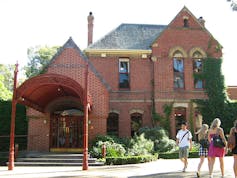University changes to academic contracts are threatening freedom of speech
Some universities are attempting to insert new clauses into their employment contracts that aim to limit academics’ ability to speak freely in public debate.
All universities acknowledge the role that academics have in public engagement. The University of Sydney for example, states that staff “are encouraged to engage in debate on matters of public importance”. The University of Queensland states that staff are encouraged “to contribute to public debate and media comment”.
Universities recognise that staff are free to make public commentary, as long as it does not prevent them carrying out their normal duties – and as long as they do not claim to be speaking on behalf of the university.
There are also usually other limits imposed on academics’ ability to comment publicly, such as not engaging in harassment, vilification or defamation.
However, it has been reported that some universities are trying to extend or redefine misconduct to prevent academics from speaking out on any matter that is not directly confined to their area of expertise.
How do you define area of expertise?

At Melbourne University it has been reported that management recently proposed restricting academics’ ability to comment publicly to their areas of expertise.
The university soon backed down on this proposal, and now states that it recognises the right of academics to speak freely in public discourse on any matter.
In spite of the backdown, this was an interesting development.
While academics conduct research and develop a speciality within their own discipline, the boundaries of their specialities are also unclear.
Political science academics, for example, often comment on political issues in the news even though their speciality might be in elections, political theory, international organisations, or political parties.
Limiting the freedom to speak publicly to only one’s area of expertise opens the door to management making arbitrary decisions on the boundaries of academics’ expertise.
Trying to define an academic’s area of expertise in a confined way could undermine the ways in which they are able to bring their perspectives to bear on complex social problems.
More importantly, it would not acknowledge the special role that academics have in public discourse. This derives from their dedication to creativity in intellectual life and the pursuit of new knowledge.
Trying to restrict the topics on which academics can speak publicly is a limitation on their academic freedom – and therefore a restriction on their freedom of speech.
This is not the only mechanism that has been suggested to restrict academic freedom.
In recent negotiations at Murdoch University over the terms of a new collective employment agreement, it was reported that the university wants to include in its definition of misconduct actions that might risk the “reputation, viability or profitability of the university”.
As well as resting on highly subjective terms – who would determine whether something risked a university’s reputation or profitability? – this is a significant extension of the meaning of misconduct.
Misconduct usually includes things like theft, assault, making up data instead of actually doing the research, improperly giving a benefit to a family member, or disclosing confidential data. Whether something amounts to “misconduct” or “serious misconduct” depends on the nature and scope of the conduct undertaken.
Including risking the viability or profitability of a university in the items that constitute misconduct could lead to a chilling effect on academic freedom. In free speech theory, a chilling effect occurs when people self-censor for fear of being accused of doing something wrong.
Protecting freedom of speech
Academics are often asked to comment on matters of public debate both within their specialised expertise and on general matters of interest. It should be up to the academic concerned to determine whether they feel qualified to comment on an issue or not.
Engagement in public debate is vital if academics are to have an impact on society, improve public policy, and enable the development of new solutions to complex problems.
Last year the federal government placed greater importance on research impact and engagement. It said universities needed to build stronger relationships with business and the community to ensure their research was having an impact on society.
The kinds of restrictions reportedly being suggested by some university managements run counter to this mandate to improve the interaction between the academic pursuit of knowledge and social impact.
Academics need to retain their freedom to speak on matters of interest, which intersect with their specialised knowledge, even where that intersection is tangential or not visible to others. They need to be able to speak out on matters of public concern without fear that they might be perceived to be placing the viability or profitability of their university at risk. Academic freedom is the key legitimating concept of the entire university system.
- Linking devices:
This week to improve my English I have been studying and reading books.

No hay comentarios:
Publicar un comentario